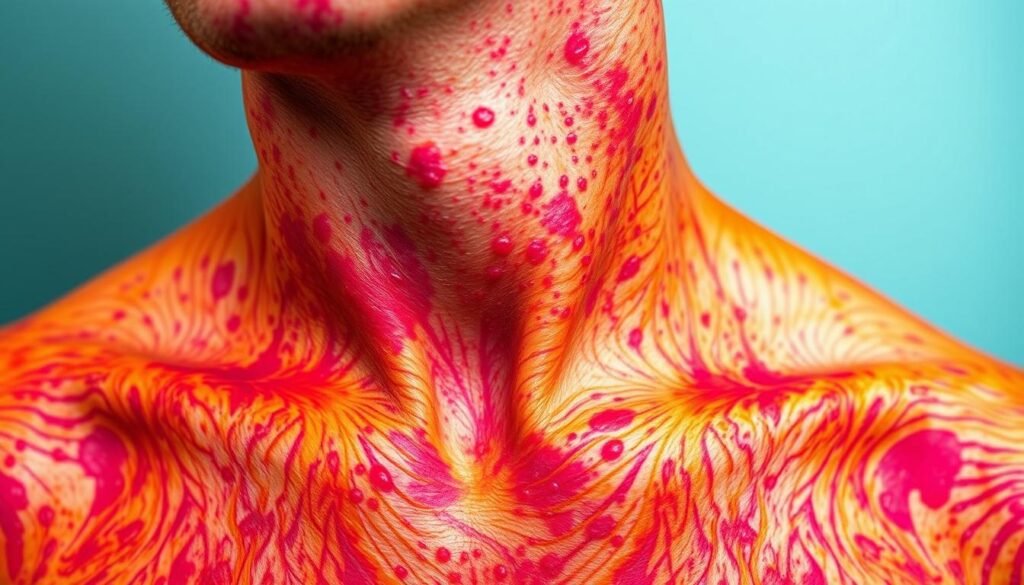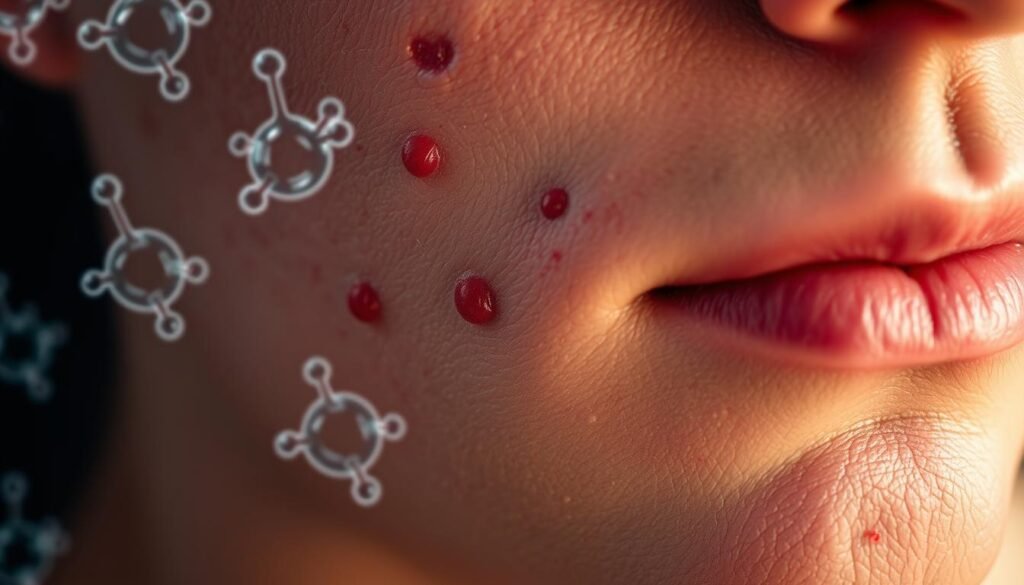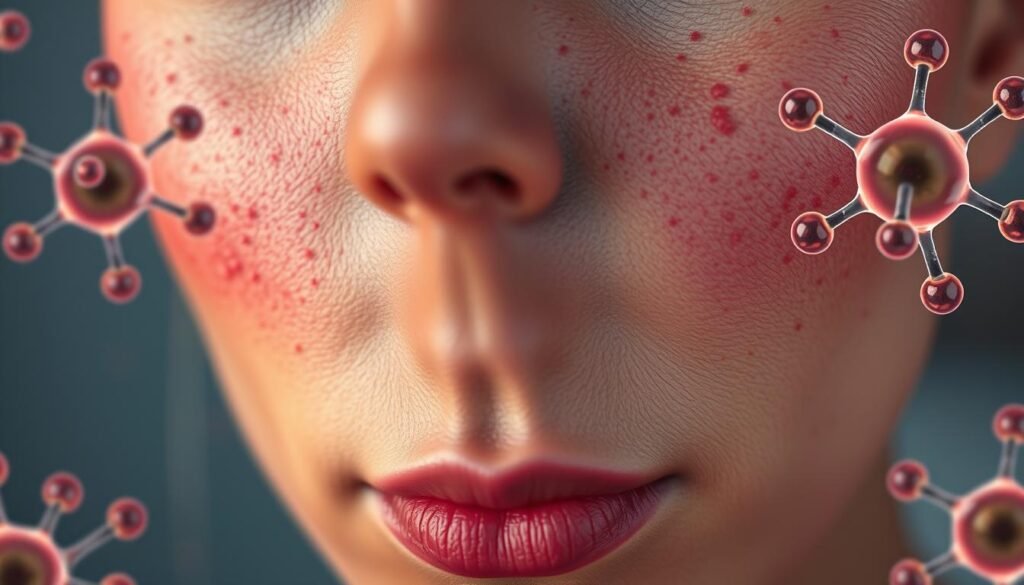About 72% of women ages 18 to 45 with acne have high androgen hormones, like testosterone. This fact shows a key link between hormones and skin health, especially for treating hormonal acne. Knowing how testosterone works is crucial for those dealing with acne and seeking ways to manage it.
When testosterone levels change, they can affect skin health by increasing sebum, which may cause pores to clog and lead to acne. In this article, we’ll delve into how testosterone and acne are connected. We’ll also look at different things that can change hormone levels, from life choices to natural changes in the body. This info aims to help readers manage their skin health and find options to treat acne tied to testosterone.
Key Takeaways
- 72% of women with acne have excess androgen hormones.
- Testosterone levels can increase during puberty for both genders.
- Natural variations in testosterone levels can significantly affect acne development.
- Healthy lifestyle habits can help maintain balanced testosterone levels.
- Topical treatments and oral contraceptives can aid in acne management.
- Genetics and diet also play a significant role in acne severity.
- Understanding hormonal fluctuations is key for effective acne treatment.
What is Testosterone?
Testosterone is an important hormone, mainly known as the male sex hormone. It plays a big role in male traits like bigger muscles and strength. Both men and women make this hormone, but in different amounts. It’s key for many body functions.
In men, testosterone affects bone thickness, the ability to have children, and sexual desire. For women, female testosterone production happens in the adrenal glands and ovaries. It helps with ovary health and feeling good overall. The testosterone definition shows how it’s important for both sexes.
It’s important to know about testosterone and how its levels change. These changes can affect your skin’s health. For example, more testosterone can cause acne. This is often seen when men and women use hormone therapy. It points out why managing hormone levels is key for healthy skin.
How Testosterone Affects Skin Health
Testosterone’s link with skin health is key but complex. It plays a big role in how much sebum your glands make. These glands, found near hair roots, need testosterone to work right. When there’s more testosterone, they may work too hard, leading to too much sebum. This extra sebum can clog pores and help acne to start.
About 50 million people in the US get acne each year. It’s the top skin issue here. A 2019 study found testosterone levels can show how bad acne might get. It highlighted why knowing about testosterone’s skin effects matters. In transgender men taking testosterone, sebum and acne tend to go up. This agrees with other studies.
During puberty, a big rise in testosterone may cause more acne in teens. Some medicines, like testosterone boosters and steroids, can also up testosterone levels. This makes acne risks higher. People on Testosterone Replacement Therapy (TRT) might get more acne because of more sebum. Even though acne is a common TRT side effect, there are ways to deal with it.

Getting the hang of how testosterone works with your skin helps in handling acne. Knowing about hormone balance can improve things for those dealing with acne and similar issues.
| Effects of Testosterone on Skin Health | Implications |
|---|---|
| Increased Sebum Production | Blocks pores, increases acne risk |
| Elevated Levels During Puberty | Higher commonality of acne in adolescents |
| Response to Testosterone Therapy | Correlation with increased acne incidents |
| Medication Impact | Can elevate testosterone beyond normal ranges |
| Genetic Predisposition | Increased likelihood of acne breakouts |
Understanding Acne: The Basics
Each year, acne affects up to 50 million people in the U.S. alone. It usually starts when hair follicles get clogged with oil, dead skin cells, and bacteria. There are types of acne such as whiteheads, blackheads, pustules, cysts, and nodules, each needing its own treatment strategy.
Knowing acne symptoms is key to treating it right. Symptoms can be mild, like small blemishes, or severe, like painful cysts. They show different stages of acne development. How bad the symptoms are helps decide the treatment, which might be creams, pills, or changing your lifestyle.
Though diet and cleanliness matter, acne is mainly driven by hormones and genes. Testosterone, for example, can make acne worse. For more details on acne, check out this resource.
| Type of Acne | Description | Treatment Options |
|---|---|---|
| Whiteheads | Closed clogged pores | Topical retinoids |
| Blackheads | Open clogged pores that oxidize | Salicylic acid |
| Pustules | Red bumps with pus | Antibiotics, benzoyl peroxide |
| Cysts | Deep, painful lesions | Oral isotretinoin |
| Nodules | Large, solid bumps under the skin | Corticosteroid injections |
Getting the basics of acne helps us find the root cause and how to treat it. Hormonal factors, including testosterone, play a big part in this.
Testosterone and Acne: What’s the Link?
Testosterone and acne are linked because high testosterone can increase sebum production. Sebum is an oil made by your skin. When there’s too much, your pores can clog and lead to more acne.
How Testosterone Influences Sebum Production
Testosterone makes the sebaceous glands produce more sebum. This makes the skin oily, clogging pores. A 2019 study with over 300 people found high testosterone levels make acne worse. This can change small skin issues into bigger breakouts.
The Role of Androgens in Acne Development
Androgens like testosterone are key in causing acne. Hormonal changes, like puberty or external testosterone, raise androgen levels. This makes oil glands overactive. As a result, people get more pimples, whiteheads, and blackheads.

Why Hormonal Acne is Not Just a Teen Issue
Acne is not just a teen problem. Adult acne is also on the rise. Studies show many adults face hormonal acne even after their teen years. In the U.S., about 50 million people deal with acne, proving it’s common among adults too.
Hormone fluctuations, especially testosterone in adults, cause acne to flare up.
Women are more affected due to menstrual cycles and menopause. Disorders like PCOS can worsen hormonal imbalances, leading to more acne. Knowing how hormones affect adult acne is key to managing it.
Many women report acne between 30 and 50 years old. These cases are often mild to moderate but can be persistent. Studies reveal 20 to 40 percent of adult acne cases start after puberty.
Menopause can cause acne even if androgen levels seem normal. This is because of lowering estrogen levels. Around 55% of women with acne have high androgen levels, showing the importance of targeted treatments.
Acne can deeply affect self-esteem and life quality. But, treatments like Spironolactone and Metformin are effective for hormonal acne. Acknowledging adult acne allows for better treatment approaches.
Face mapping can also help understand acne’s health connections. Learn more about acne and health here.
| Age Group | Percent Affected by Acne | Common Causes |
|---|---|---|
| 11 to 30 | 80% | Hormonal fluctuations, genetics |
| 30 to 50 | Growing numbers | Menopause, hormonal imbalances |
| Over 50 | Varied | Hormonal changes, chronic conditions |
Does Testosterone Cause Acne in Women?
Testosterone significantly affects a woman’s skin health. Acne is the top skin problem in the US, affecting up to 50 million people a year. The link between testosterone and acne in women is becoming clearer.
Hormones change a lot during a woman’s life, like during puberty and monthly cycles. These changes can raise androgen levels, which might lead to more acne.
Studies on Testosterone Levels in Women with Acne
A lot of research has been done on how testosterone relates to acne severity in women. A 2019 study with over 300 people found that 40% of them had worse acne from high testosterone. Another study looked at transgender men on testosterone therapy and noticed more sebum production and acne.
This shows how hormone changes can affect the skin.
Adult women often get acne from hormone changes during important life stages. Changes during periods or menopause can cause severe acne. Treatments that balance testosterone and estrogen levels may help. It’s good to talk to a skin doctor for advice.

Getting to know how testosterone and acne are linked in women helps in finding the right treatments. For more details, check out more information on how hormones impact skin health.
Testosterone Fluctuations: Causes and Effects
Testosterone levels change because of many factors throughout life. Knowing about these changes can teach us how our lifestyle affects our testosterone. It also shows how changes in hormones can affect our health.
Impact of Stress and Lifestyle on Testosterone Levels
Stress plays a big role in changing our hormone levels, including testosterone. High stress can increase cortisol, which then lowers testosterone. Living a healthy lifestyle can help fight these effects. Things to try include:
- Regular physical activity
- Balanced nutrition
- Quality sleep
- Meditation and relaxation techniques
By living healthy, you can keep your testosterone levels balanced. This also reduces the chance of getting acne from hormone imbalances.
Natural Hormonal Changes: Puberty to Adulthood
When we go through puberty, our testosterone levels spike. This can make acne worse by increasing sebum. As we get older, our testosterone levels usually even out. However, after turning 30, these levels might start to drop. Here’s how testosterone levels change at different ages:
| Life Stage | Average Testosterone Levels |
|---|---|
| Childhood | Low and Stable |
| Puberty | Increase Significantly |
| Adulthood (20s to 30s) | Peak Levels |
| Adulthood (30s and Beyond) | Gradual Decline |
Knowing about these hormone changes can help us prevent acne. It also helps in keeping our skin healthy.
Managing Testosterone Levels for Better Skin
Managing testosterone well is key to better skin and less acne. Healthy lifestyle choices significantly improve skin look. Regular workouts, good sleep, and less stress help balance hormones. Adopting these acne management strategies fights oiliness and clogged pores linked to high testosterone.
Avoid corticosteroids and anabolic steroids because they increase testosterone a lot and make skin worse. Changing diet is important too; eat less refined carbs and more nutritious food. This approach helps keep testosterone levels in check over time.
There are specific treatments for tough acne. Prescriptions like tretinoin or isotretinoin offer relief for bad outbreaks. For those undergoing hormone therapy, knowing how testosterone affects skin is vital. To learn more, visit this resource.